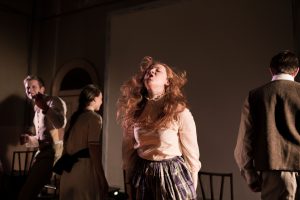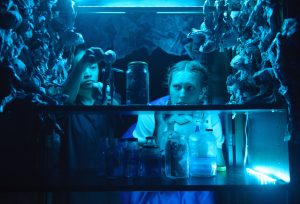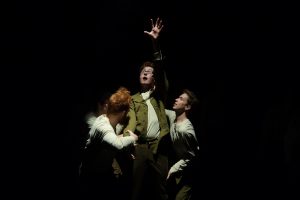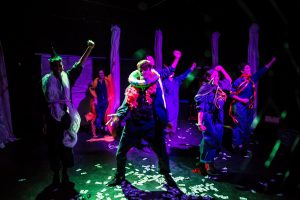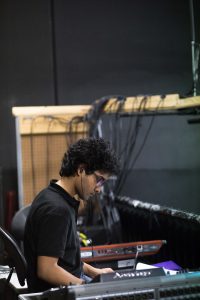In a fractured digital landscape, live theatre seems obsolete. It does not offer the convenience and on-demand nature of Netflix, it does not promote a rewatchable or sharable experience and it does not always provide a particulaly palpable piece of entertainment. Instead theatre offers something different; a singular moment, an artistic flair that burns both brightly and swiftly, yet continues to smoulder within the minds of its respective audience. Theatre can be a heart wrenching, personal experience, a comic amalgamation of Shakespeare’s work or a rock musical about mental illness. Theatre may not be similar to other popular mediums, but that does not mean it is irrelevant, in fact it could be seen as essential because of this very reason.
At Monash, the requirement and need for such a medium can not be underestimated. The Monash University Student Theatre (MUST) provides an outlet for self expression, whilst also promoting relevant discourse in regards to issues facing the world today, a fact that the theatre’s Artistic Director, Yvonne Virsik, believes contributes to the program’s success.
“[Theatre]’s a form in which we can uniquely investigate what it means to be human, tell great stories and provoke discussion and awareness of political issues. At university, it provides a great resource for encouraging conversation, increasing social awareness and knowledge of other cultures and lifestyles and for experimentation with new technologies and artistic forms.”
Such a form of cultural expression involves a lot of student involvement. Even individuals who choose not to act can still expand their skill set in other areas of the theatre. The director of MUST’s forthcoming musical (Next to Normal, which opens in late May), Stephen Amos, describes this oppurtunity and community best.
“In first year, student theatre was an amazing way of helping me find my feet, and do something that I was passionate about, alongside my studies! Most of all though I think it’s the whole community and groups of people you meet and make connections with that really make it so worthwhile. I think MUST really has something for everybody too, whether it’s seeing a show, working on one backstage, getting to know a new role in an assistant stage management position, or being on stage as an actor!”
Besides the roles Amos lists, students can also light stages, direct performers, plan and build sets, promote shows, photograph theatre events and even develop sound design. There are so many different areas for creative minds to truly thrive within MUST and refine their own abilities, as well as learn new ones. Skills such as these can not be taught in a lecture hall or in a tutorial, they are talents that are nurtured and fostered within a practical environment. Justin Gardam, the director and writer of MUST’s next upcoming piece, the tentatively titled Late Show (running from the 7th to the 13th of April), summarised this point, stating:
‘Student theatre challenges you. It fosters the sort of mindsets and practical problem-solving you’ll need to thrive in your industry, whether it be theatre, commerce, or medicine. It gives you great collaborative skills. It pushes you out of your comfort zone, and gives you the confidence to take risks, fail, fail a few more times, and finally succeed.’
Many of MUST’s other directors have reiterared similar thoughts on how the student theatre was integral to their development as artists, allowing them to take forward steps in the theatrical landscape and thereby inject fresh blood into a dying industry. In some ways MUST provides an art institution that is both ingrained within the university, but is also part of a far broader branching industry. As Virsik descibes:
“MUST is a vibrant feeder of the arts sector in Australia. Scratch the surface of a company and you’ll find ex-MUSTers influencing our culture and heading the surge for exciting, responsive, innovative projects.”
Since the removal of the Bachelor of Performing Arts degree, Monash has been lacking in hands-on, practical courses for arts students, however MUST has supplied an avenue for creativity, whilst also connecting students to possible contacts within the industry. Such a resource is invaluable to Monash students. The director and co-writer of MUST’s O-Show 2017 and last year’s Jamie and the ATAR, Fraser Mitchell, has gone so far as to establish his own company, T Minus Theatre, by utilising the skills he learnt at the student theatre.
‘MUST provided me with a supportive environment and me the opportunity to apply my skills. I value that more than anything. My new show, Jamie and the Asynchronous Temporal Atomic Reverberator, was originally developed at MUST and we went through a lot of shitty drafts before we found the show we liked. Those first mistakes were essential to the show’s creation and we wouldn’t have been able to make those mistakes without student theatre.’
Mitchell’s musical comedy, aimed at high school students, will be on at the Metonoia Theatre as part of the Melbourne International Comedy Festival.
As aforementioned, another inviting element of Monash’s student theatre is the importance placed on self-expression. For many, one’s university life represents a transitional period from reliance to independence and in such a state it can be difficult to unearth one’s purpose, passions and even identity. It’s easy for these factors to be shaped by our actions, but the people we surround ourselves with can also construct them. MUST offers both of these fundamental building blocks of the self, through the supportive community and the near unlimited opportunities to flex, often neglected, creative muscles. The director of the Awakening remount (at fortfivedownstairs in May), Daniel Lammin, contributed much of his success in the industry to these factors.
‘I started studying theatre at Monash planning on becoming an actor, but if it hadn’t been for MUST and the encouragement and support of that community, I would have discovered that my love and skill in directing was even greater. I couldn’t have done it without their support, which is part of the reason I’ve come back to make work with MUST so often and to mentor the next generation of theatre makers they’re fostering. I feel I owe that to them for everything they gave to me. Their importance to me is part of who I am as a theatre maker, and their importance to the Melbourne theatre community as a whole is impossible to calculate.’
Lammin went so far as to commend MUST for their guts and faith in his projects, which hints at the limitless approach adopted towards self-expression within the community. However, this attitude is not consistent throughout all areas of the industry, with companies struggling to pay larger casts outside of the popular, westernised musicals. This flaw within the wider industry highlights what could be the most underrated and important parts of student theatre, the students. These are individuals who bring enthusiasm, creativity and a unique voice to an industry that is struggling to keep its foothold within public popularity. It’s this youthful energy, which results in brilliant, unrefined creations, skyrocketing the next generation of theatre makers into innovative and original projects. Helena Dixon has experienced this effect first hand, allowing her to build confidence and even step up to direct MUST’s stage version of Frankenstein (running from the 11th to the 20th of May), thereby helping her to contribute to the culture that she has truly flourished in.
‘MUST provides this fantastic space for a bunch of really weird, wonderful and talented students to come together and share in a common passion. It’s provided me with a place to learn and grow in ways completely different to what I’ve learnt from my degree. Especially as a science kid, it has been my main creative outlet, which I will always be thankful for. And honestly, because of the people I’ve met through student theatre I’m a lot stronger and more confident in my abilities both inside and outside of the theatrical sphere.’
The constant difficulties faced when justifying theatre’s relevance is probably best explicated and directly tied to the texts of Shakespeare and whether they still have a place within our society. Niamh Percy, the director of Monash Shakespeare Company’s (MSC) first semester’s show, The Complete Works of Shakespeare: Abridged, still thinks there is great value in the bards work.
“To many people Shakespeare is something they have to tolerate at high school and never deal with again. I think this is such a sad attitude; Shakespeare can be so exciting and different – as Monash Shakespeare Company has started to prove! Shakespeare has done so much for our culture and language, enriching the modern day more than most realise. It’s important to appreciate that I think!”
Her show, running from the 27th of April to May 6th, aims to shift this attitude by combining all 37 of Shakespeare’s plays into one 90-minute piece of hilarity. The second semester show, directed by Gina Dickson, takes a different approach by interpreting Taming of the Shrew, one of the bard’s more controversial comedies, into an empowering piece for the modern day woman. Both of these interpretations perfectly encapsulate the importance of student theatre, as they provide social commentary and entertainment out of 400-year-old texts.
Without MUST or the MSC theatre would not have it’s same potency or risk-taking abilities, these performances project the voices of a generation and breath new life and new interpreatations into the Australian art sector. Through innovation, creativity, passion, experiementation, failure and community student theatre breaks new ground, questions normality and reignites the flames of a dying, but undoubtedly necessary cultural medium.
To get involved in the MUST or MSC Season:
- Come to the O-Show during O-week and chat with students at the MUST and MSC info tables
- Sign up for the MUST e-bulletin via the web site: msa.monash.edu/must
- Like the MUST and MSC Facebook pages
- Check out the info and audition sign ups in the MUST corridor
- Come see the shows!
- If you are desperate to get involved in a specific crew role, make an appointment via email with MUST’s Artistic Director, Yvonne Virsik: yvonne.virsik@monash.edu
